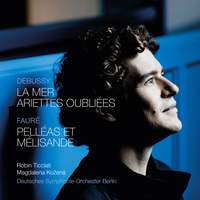Recording of the Week,
Simon Rattle conducts Debussy's Pélleas et Mélisande
This recording of Debussy’s Pélleas et Mélisande was made during a semi-staged performance at the Barbican last January, ten months after Simon Rattle was announced as the new music director of the London Symphony Orchestra, and augurs extremely well for what’s to come from the collaboration. If this concert was in a sense an engagement-party for conductor and orchestra, it was also a (fittingly secular) requiem: Rattle dedicated the performance to the memory of Pierre Boulez, who had died earlier that week and who was closely associated with the work, and his interpretation shares many of the strengths of Boulez’s own accounts, such as the meticulous but never micro-managed shifts of mood and colour, coupled with a lush spaciousness that’s all Rattle’s own. One of the new recording’s great strengths lies in Rattle’s knack of balancing stillness and urgency (which are demanded in very close proximity in this score, such as in the lakeside scene where Mélisande loses her ring); another is his gift for psychological drama. The huge orchestral forces don’t so much support or react to the characters as become one with them, much as a great lied-pianist does with their singer, so that in the first scene they switch in a heartbeat from embodying Golaud’s self-importance to becoming part of Mélisande’s anxiety.
 The Czech mezzo Magdalena Kožená is idiosyncratic of voice and stage-presence, and in Mélisande those idiosyncrasies mesh perfectly with the character. Her slim, high-lying mezzo has a nervy, anaemic quality that can underwhelm in full-blooded Romantic repertoire, but which makes it the ideal vehicle for Mélisande’s febrile yet curiously detached sensuality. In the live performance I had the uncanny impression that Mélisande is somehow the role she’s been channelling all along, for instance in her emotionally aloof Carmen on Warner Classics and her strangely eroticised Angel in Gerontius at the Proms two years ago.
The Czech mezzo Magdalena Kožená is idiosyncratic of voice and stage-presence, and in Mélisande those idiosyncrasies mesh perfectly with the character. Her slim, high-lying mezzo has a nervy, anaemic quality that can underwhelm in full-blooded Romantic repertoire, but which makes it the ideal vehicle for Mélisande’s febrile yet curiously detached sensuality. In the live performance I had the uncanny impression that Mélisande is somehow the role she’s been channelling all along, for instance in her emotionally aloof Carmen on Warner Classics and her strangely eroticised Angel in Gerontius at the Proms two years ago.
As Pélleas, Christian Gerhaher matches her otherness every step of the way – Golaud might not be the most reliable of narrators, but one truly believes his observation that his younger brother is ‘un peu étrange’. Ever the most self-effacing of performers, Gerhaher’s blend of diffidence, compassion and courtesy in his early encounters with Mélisande seems almost an extension of his own recital-manner, so that the moment when the synergy between them flares into a sort of passionate perversity really takes you by surprise: no matter how Golaud might emphasise the ‘childlike’ quality of this odd couple, the Rapunzelesque scene in which he bathes in her hair is very audibly adults-only stuff.
But at the heart of all this is Gerald Finley, unravelling with an agonising slowness worthy of Otello: I mean absolutely no disrespect to Kožená and Gerhaher when I say that this recording could creditably be billed as Golaud. Pélleas and Golaud’s mother Geneviéve is usually assigned to a true contralto, but Bernarda Fink’s tonal similarity to Kožená’s Mélisande creates a heightened empathy between the two (complementing the occasional flashes of family resemblance between Finley and Gerhaher in terms of timbre).
Treble Elias Mädler takes the small but crucial role of Golaud’s young son Yniold, often cast with a light adult soprano because of its musical and dramatic demands. Mädler already has operatic form (appearances include Oberto in Handel’s Alcina opposite Philippe Jaroussky), and it shows: in the ugly, unbearably tense scene where the boy’s father forces him to spy on the uncle he adores and the woman he refers to as ‘petite mère’, he responds to Finley’s every switch of mood with the nervous insecurity of a child who’s grown up forever unsure if he is to be petted or shaken. It’s heart-breaking.
There are several parallels with the first fruits of another promising new conductor-orchestra relationship which recently debuted on record, also with Debussy as their trousseau: Robin Ticciati’s inaugural recording with the Deutsches Symphonie-Orchestra Berlin couples a luminous account of La Mer with the Ariettes Oubliées (sung, coincidentally, by Magdalena Kožená) in new orchestrations by Brett Dean, and Fauré’s Pélleas. The vivid, glowing colours which he conjures from the brass in particular has much in common with Rattle’s take on Debussy, and on this evidence the prospect of future recordings from both new partnerships is mouth-watering.
Christian Gerhaher (Pelléas), Magdalena Kožená (Mélisande), Bernarda Fink (Geneviève), Franz-Josef Selig (Arkel), Gerald Finley (Golaud), Elias Mädler (Yniold), Joshua Bloom (Shepherd/Doctor) London Symphony Orchestra, Sir Simon Rattle
Available Formats: MP3, FLAC, Hi-Res FLAC
Magdalena Kožená (mezzo) Deutsches Symphonie-Orchester Berlin, Robin Ticciati
Available Formats: CD, MP3, FLAC, Hi-Res FLAC




